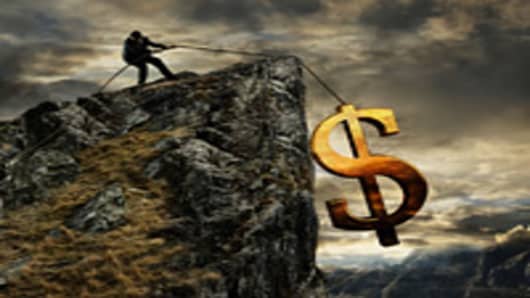America's battle with the vaunted "fiscal cliff" could be only in its early innings as Washington legislators grope to find a political solution that likely will be only temporary, widely followed analyst Greg Valliere said.
The chief political strategist at Potomac Research Group in Washington actually differs from the cliff alarmists, as he sees Congress reaching a temporary agreement before the end of the year.
But he believes the accord will only paper over longer-term debt and deficit issues vexing the US economy. (Read More: Geithner Warns Against Delaying Solution to US Fiscal Crisis)
"They'll do enough to get us through this crisis," Valliere said in remarks at the Charles Schwab Impact 2012 conference in Chicago. "We'll probably have to visit these issues again and again."
In his first observations since President Barack Obama won re-election on Nov. 6, Valliere said the fiscal cliff and its series of tax increases and spending cuts set to take place Jan. 1, 2013 is Washington's biggest challenge.
The economy will go over the metaphorical cliff unless lawmakers and the White House agree on deficit-reduction targets by the end of the year.
Broader debt reduction won't come anytime soon, Valliere said, because of three factors: 1) the capital markets, awash in Federal Reserve liquidity and zero interest rates, are not demanding it; 2) Congress has shown itself inept at getting even the small things, like Post Office reforms, accomplished, let alone tackling trillion-dollar deficits; and 3) Obama himself has shown limited skills as a deal-maker.
"We can get something in December," said Valliere, who added he has heard some Democrats talk about going over the cliff purposely so "the president can come back in January and say, 'I want a big tax cut, except for the rich."
That desire to increase taxes on top earners was a cornerstone of Obama's campaign and a point from which he never wavered. (Read More: Obama 'Open to New Ideas,' but Rich Must Pay More)
In analyzing the presidential race, Valliere said the president's strategists served him well, while the results themselves reflected the problems Republicans are having connecting with key constituencies such as Latinos and women.
"This country is undergoing a demographic tsunami," he said. "This country is not the country we had two decades ago."
Obama's campaign was successful in "portraying Mitt Romney as Gordon Gekko," the ruthless capitalist from Oliver Stone's "Wall Street" movies, Valliere added. "Why the Romney campaign did not hit back in June or July is the stuff of endless second-guessing."
Valliere said Romney was a good candidate who was unable to overcome broader conflicts between Republicans and the electorate. (Read More: On Wall Street, Time to Mend Fences With Obama)
"The party has a problem with its brand. They have a brand problem with Hispanics and women," he said.
Looking forward, the GOP will have a large contingent of candidates who think they can carry the banner in the 2016 campaign.
"Twenty people are going to look in the mirror tomorrow morning and think that they're a player," Valliere said.
The one with the inside track: Florida Sen. Marco Rubio, Valliere said.
As for the more immediate future, Valliere suspects a "kick-the-can" approach to fiscal cliff deal-making that will avert the imminent crisis — only to postpone it for another day.
"This president does not want to start his second term in an economic crisis," he said. "Obama knows this much: People in Washington, including Democrats, think that he's not a very good politician. It's in his interest to get a deal in December."



